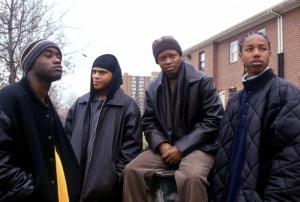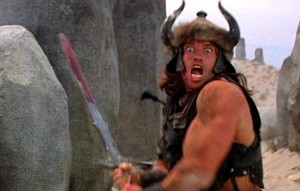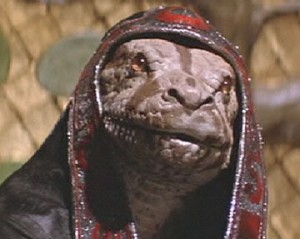
Perich: Given Barack Obama’s explicit, continued support for the War on Drugs, that’s … “ironic” is the nicest word for it.
Sheely: I think that Obama’s love of The Wire can be explained mostly by Orrin Hatch’s observation that Obama is a latte-sipping fedora-wearing hipster.
Stokes: What’s weirder: liking The Wire and backing the war on drugs? Or being a high-ranking official in a governmental agency and liking The Wire?
It’s not that The Wire says that high ranking officials are necessarily wicked or incompetent – it’s that it says they are powerless in the face of institutional pressures to do anything other than feather their own nests. Seems like a weird message for any politician to respond to – an honest one would find it overly cynical, a corrupt one would think it hit too close to home.
For fun now, let’s all imagine the most politically damaging character he could have chosen as his favorite. Is it:
1) Marlo
2) Carcetti
3) Ziggy
Perich: 4) Brother Mouzone.
Fenzel: Well, a politician who feels trapped by institutions would most likely regard The Wire as honest and realistic, and would not feel threatened by it because they see themselves as the protagonist and the other politicians as the real problems.
After all, it is about the heroic struggle of Tommy Carcetti to follow his dreams in a world gone mad, right?

Stokes: See, Conan’s policy decisions as emperor of Aquilonia can only be understood as the product of a Cimmerian anti-colonialist political philosophy.
Fenzel: The thing is, the world in the two stories is pretty similar. Political institutions are corrupt, and the people who run them are malicious, insane, or cowed into submission. The protagonist looks around him or herself and sees no obvious place to turn or way to make things better. The world is a bit too rough for the kind of love we’d all like to surround ourselves with to really survive.
The difference is in the relative success of the heroes to cut the Gordian Knot. I’m not certain one story of exceptional success against many of profound failure necessarily teach mutually exclusive lessons.
We also don’t see when one harvest goes sort of bad and the people riot, begging Conan to reinstate the snake god, which he ends up having no choice in doing, with the rationalization that it is a young, small snake god and he can slay it later when things improve.
Stokes: The fundamental difference between the Conan-verse and, uh, Baltimore, is that he *would* slay it, although not before it had gotten totally out of hand.
Also, we just described the back half of the Zemeckis Beowulf adaptation.

Financial sector deregulation – The Snake God wreaked havoc generations ago, but we let the Snake God come back, thinking the Snake God would regulate itself while making us fabulously wealthy.
Perich: Health Insurance: the temples of the Snake God minister to the sick and wounded, but they also extort dire levies from the provincial governors. Everyone agrees that huge lines of plague victims circling the temple, waiting to be treated, are an inefficient means of addressing the problem. But nobody has an adequate solution.
In the meantime, the governors tack new decrees onto the existing solution, creating a complex bureaucracy that just barely functions. The latest law is that, instead of tithing to the Snake God, citizens will tithe to the governor’s office and receive a special sash that entitles them to healing balms. This has led to shorter lines at the temple but increased confusion.
Fenzel: In one view, the snake god is a good example of the difference between allegory and symbol. The snake god doesn’t really claim to reference a specific idea, trend, institution or thing. It comes to symbolize a variety of things depending on how it appears in a given story. In the scene about the Riddle of Steel where James Earl Jones makes the young girl jump to her death, the snake god represents rapacious male sexual hunger — but Conan, in opposing the snake god, doesn’t really oppose that directly. In the scenes where Conan actually confronts and sets himself against the snake god, it tends to represent other things.
Another way of looking at it is that the tension between wanting a snake god and wanting to kill the snake god is irresolveable – and it’s not really a quality of institutions or religious entites, but of the human psyche – more specifically the human psyche viewed through the lens of language, rather than through, say, cognitive experiments on people’s general feelings about snakes. The snake god is the unachievable major object of desire, and the only way to actually satisfy your desire for it is to kill it – which means not necessarily that people must wreck things they like, or just that desire is dangerous, but that major desires can only exist as major to us if we consider them from a certain distance. Because of the way our consciousnesses and relation to other things are brought into being, there’s a way by which the major object of desire ceases – either we kill it, it kills us, it becomes so sinister as to no longer be desired – our semiotic and psychological relationship with the Big Things we want is necessarily unstable.
One could say the same of the Presidency. It is the thing you really really want until it becomes close enough to you that by one mechanism or another it has to cease being the thing that it was.
One could say the same of Hampsterdam.
Belinkie: Let’s kick it up a notch. According to Barack Obama’s Facebook page, his favorite movies are:
Casablanca, Godfather I & II, Lawrence of Arabia, and One Flew Over the Cuckoo’s Nest
I think those are VERY interesting. The Godfather movies, Lawrence of Arabia, and One Flew Over the Cuckoo’s Nest are all about men growing into leaders. They start the movies actively ducking responsibility, step up to the plate, earn the trust of their subordinates, and rise to greater heights than anyone thought possible. But effective leadership comes at horrible personal cost. Michael Corleone alienates his wife and kills his own family members, Lawrence leads his men in a horrible massacre, and Jack Nicholson gets pillowed to death. These leaders are miserable and lonely men.
As for Casablanca, I’m guessing he’s just a big old softie at heart.
Mlawski: Jeez, what does it say about me that my very first thought was, “Do any of those pass the Bechdel test?”
Perich: Casablanca also has some interesting things to say about the utility of law-enforcement institutions in achieving real justice, if you consider Captain Renault’s face turn at the airfield.
Fenzel: This sort of raises the point of what “Barack Obama” is. Are these the actual favorite movies of an actual person, or attributes of a construction put together as part of a discourse of power? Is there a difference, discursively? Is there any way to tell?
And that’s where we left it, Overthinkers! But what do you think? Do Barack Obama’s stated pop culture favorites represent the genuine fandom of a constitutional scholar? Or are they calculated ploys to appeal to voters? Or does the one naturally lead to the other and back again? And how would King Conan of Aquilonia handle the entitlement burden of the Boomer generation? Sound off in the comments!
